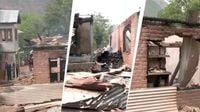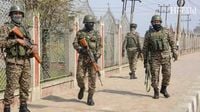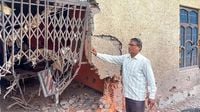In a shocking escalation of violence, cross-border shelling by the Pakistan Army has resulted in the deaths of at least 15 civilians in the Poonch and Tangdhar regions of Jammu and Kashmir. This incident marks one of the deadliest days along the Line of Control (LoC) in recent history, as the region grapples with the aftermath of increased military tensions.
The shelling, which occurred during the night of May 6-7, 2025, was reportedly initiated less than an hour after the Indian armed forces launched Operation Sindoor, a counter-offensive targeting militant infrastructure in Pakistan. This operation was a response to a recent attack in Pahalgam that resulted in the deaths of 26 individuals, including tourists, and was attributed to Pakistan-based militants.
According to reports from the Indian Army, the artillery fire has left at least 43 others injured, with many of the casualties being women and children. The local administration has been working tirelessly to evacuate civilians from the affected areas, providing refuge in designated safe locations. Eyewitness accounts describe a scene of chaos, with families fleeing their homes in fear as shells rained down on residential neighborhoods.
Among the deceased are Zoya Khan, 14, and her brother Zain Khan, 12, who tragically lost their lives when a shell struck their home in Kalani village. Their father, Rameez Khan, sustained injuries in the attack. The shelling also claimed the lives of two shopkeepers in Poonch town, Amreek Singh, 55, and Ranjit Singh, 48, who were caught in the blast while preparing for the day.
Local authorities have reported significant damage to infrastructure, with residential buildings, schools, and public facilities suffering extensive destruction. The Gurdwara Singh Sabha, a local Sikh place of worship, also sustained damage, though the community managed to safeguard its sacred texts.
As the situation continues to unfold, international reactions have poured in, with calls for restraint and mediation from various global leaders. The United Nations and other humanitarian organizations are closely monitoring the situation, emphasizing the need for dialogue to prevent further escalation.
Residents in the Poonch district describe the current atmosphere as one of fear and uncertainty. “We have never witnessed such intense shelling in decades,” said Narinder Singh, president of the Gurdwara Parbandhak Committee. “It is for the first time after the 1971 war that such heavy artillery has targeted civilian areas deep inside our town.”
The Indian Army has indicated that it is responding to the unprovoked shelling in a measured manner, emphasizing that their operations are focused on avoiding civilian casualties while maintaining security along the border. A statement from the Ministry of Defence reiterated that no military facilities in Pakistan were targeted during the recent operations, highlighting India's commitment to restraint despite the provocations.
In the wake of the violence, educational institutions in five border districts—Jammu, Samba, Kathua, Rajouri, and Poonch—have been closed for safety reasons. Airports in Jammu, Srinagar, and Leh have also suspended operations as a precautionary measure.
As families continue to seek safety away from the border regions, the Indian government has mobilized resources to ensure adequate support, including food, medical care, and transportation for those displaced by the violence.
Despite the grim circumstances, many residents are coming together to support one another. Community members have been seen flocking to local hospitals to donate blood for the injured, showcasing resilience in the face of adversity. “We are all in this together,” said one local volunteer, emphasizing the spirit of solidarity among the affected families.
The situation remains fluid, with fears of further escalation looming large. As both India and Pakistan grapple with the complex dynamics of their long-standing conflict, the need for diplomatic engagement and humanitarian assistance has never been more critical. The international community's role in facilitating dialogue and providing aid will be essential in the coming days.
As the dust settles from this latest round of violence, the hope remains that both nations can find a path toward peace, prioritizing the safety and well-being of their citizens above all else.






